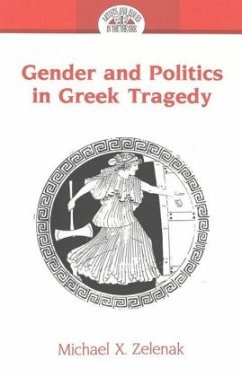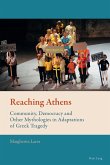Theatrical tragedy, like all other major civic institutions of the fifth-century B.C. Athenian democratic patriarchy, was exclusively male. The course of western drama changed when women characters (played by transvestite male performers) were introduced. Gender and Politics in Greek Tragedy explores themes and issues of gender identity and political ideology in plays by Aeschylus ( Suppliant Maidens , Oresteia ), Sophocles ( Antigone , Philoctetes ), and Euripides ( Alcestis , Medea , Orestes , Helen , Iphigeneia in Aulis , Bakkhai ). This is the first book-length treatment of the themes of gender and politics in ancient Greek tragedy.
"'Gender and Politics in Greek Tragedy' contributes in vital new ways to the ongoing debates over the status of women in Greek culture and its theatre. Western theatre history and its theory will be enhanced by this original consideration of cultural politics and their gender implications, couched in Zelenak's acute, elegant critical style." (Jill Dolan, author of 'The Feminist Spectator as Critic', Professor and Chair, Ph.D. Program in Theatre, CUNY Graduate Center)
"This book is a particularly valuable contribution to the contemporary study of Greek tragedy both for what it says about individual tragedies, and for its very intelligent critical strategy. Its coordination of the shifts and changes in Athenian democracy with the life of Greek tragedy through the fifth century makes for some original and extremely valuable insights into the plays." (Leon Katz, Professor of Drama, UCLA)
"This book is a particularly valuable contribution to the contemporary study of Greek tragedy both for what it says about individual tragedies, and for its very intelligent critical strategy. Its coordination of the shifts and changes in Athenian democracy with the life of Greek tragedy through the fifth century makes for some original and extremely valuable insights into the plays." (Leon Katz, Professor of Drama, UCLA)








